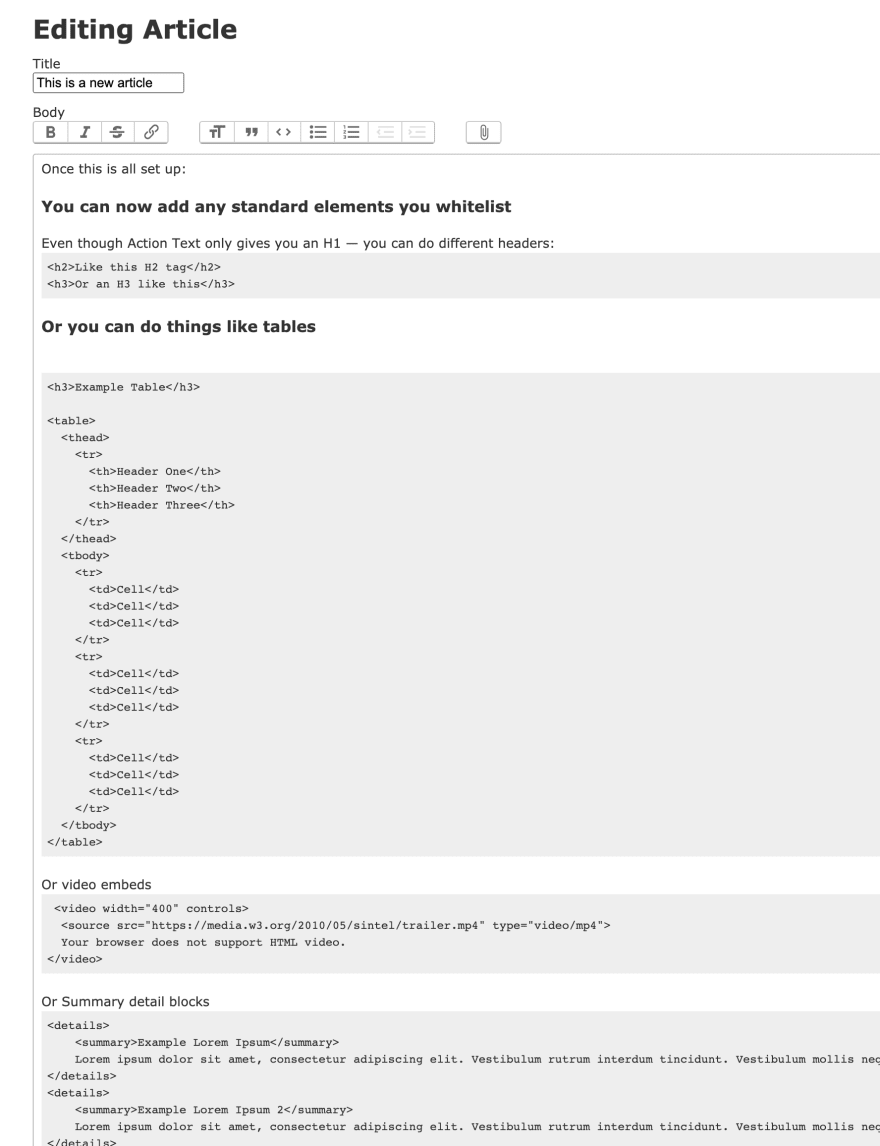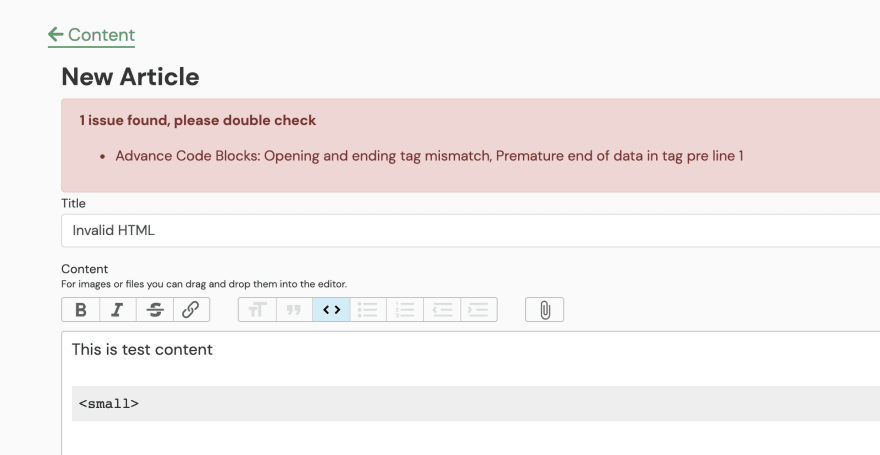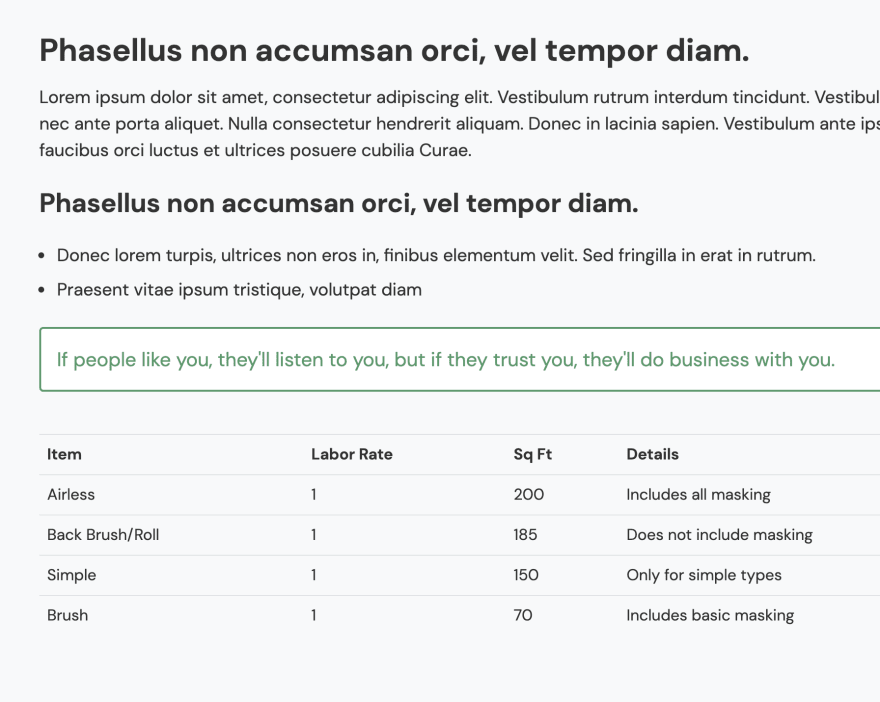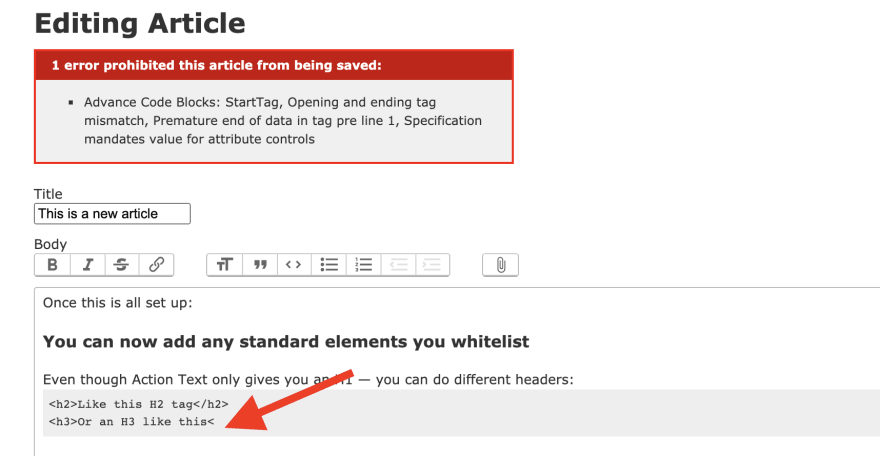
John Jacob
Posted on August 7, 2020
I work on an in house Learning Management system built in Rails. This Learning Management system allows our content team to create articles, videos and quizzes. This content is delivered through lessons for new business owners. Through these tracks they learn all they need to learn to start and run new service businesses.
Since were on rails and we needed rich text editing we reached for Action Text. Action Text gives you the solid Trix editor plug and play in your app.
Rails Action Text in Practice in our Content Library Back-end
However: Action Text / Trix doesn't support tables.
Our content team had lots of tables of information they wanted to be able to communicate. Sometimes it's hard to get across nuanced information for estimating and process without a table. We realized we needed table support in Action Text / Trix.
First Direction — Action Text Attachments
My first path was to extend the Action Text attachment model. This is what the team at Timelapse documented. Although they provided some good direction, there was nothing I could directly leverage. Also, this seems like a lot of front end complexity for a v1 of a product. Was looking for something similar. In this research I found this great Rails Conf video from Chris Oliver of Go Rails, a strongly recommended resource on Action Text attachments in general. However, decided against doing something so front end heavy (for now).
The Crazy Idea that worked: Render Code-blocks as HTML
Since this project didn't ever need a "Code Block" these articles render to a non-technical audience, why not allow any valid HTML written in a code block to render as HTML.
Pros:
- No extra front end work
- Simple Extension of the Article Decorator
- Very maintainable portable simple content (Just HTML)
Cons:
- Your users have to be reasonably technical to update HTML code-blocks
- You don't get a WYSIWYG interface when editing content
I put a rough prototype and did a screen recording to get my colleagues thoughts.
Execution
All credit goes to the great Manuel Ortega for actually making my crazy idea work, he was able to build a clean implementation that solved many of the pitfalls my prototype was riddled with.
It all essentially boils down to one plain ol' ruby object — this Richtext::CodeBlocks::HtmlService object:
class Richtext::CodeBlocks::HtmlService
ALLOWED_HTML_TAGS = ["table", "tr", "td", "th", "col", "pre", "p", "h1", "h2", "h3", "summary", "details", "row", "code"]
ALLOWED_HTML_ATTRIBUTES = []
# To Validate HTML tags and protect from bad formatted input
def self.validate(html)
errors = []
html = Nokogiri::HTML::DocumentFragment.parse(html)
html.search("pre").each do |pre_tag|
pre_tag_html, pre_tag_errors = self.ensure_well_formed_markup(pre_tag.text)
errors.push(pre_tag_errors) unless pre_tag_errors.empty?
inner_html = self.extract_inner_html_from_pre_tag(pre_tag_html)
inner_html = self.remove_not_allowed_tags_and_attributes(inner_html)
pre_tag.children.first.replace(Nokogiri::XML::Text.new(
inner_html,
pre_tag
))
end
html = ActionText::Fragment.new(html)
[html.to_html, errors.flatten.uniq]
end
# To parse each code block tag and render it to HTML
def self.render(rich_text)
html = Nokogiri::HTML::DocumentFragment.parse(rich_text)
html.search("pre").each do |pre_tag|
inner_html = Nokogiri::HTML::DocumentFragment.parse(pre_tag.text)
inner_html = add_styles_to_tables(inner_html)
advanced_code_block = "<div class='advanced-code-block'>#{inner_html.to_html}</div>"
pre_tag.replace(advanced_code_block)
end
html.to_html
end
private
def self.ensure_well_formed_markup(html)
parsed = Nokogiri::XML("<pre>#{html}</pre>")
[parsed, parsed.errors]
end
# To add our bootstrap specific classes to table elements
def self.add_styles_to_tables(html)
html.search("table").each do |table|
table["class"] = "table"
table.wrap("<div class='table-responsive'></div>")
end
html
end
def self.extract_inner_html_from_pre_tag(html)
Nokogiri::XML(html.at("pre").inner_html)
end
# To add error messages to mis-formatted HTML
def self.error_messages(errors)
readable_message = ->(e) { e.message.split(":")[3].strip rescue "" }
errors.map {|e| readable_message.call(e) }.uniq.join(", ")
end
end
Using the HtmlService
You can just add a method in the article model:
def formatted_body
Richtext::CodeBlocks::HtmlService.render(self.body.to_s).html_safe
end
and then call it in the view
<%= @article.formatted_body %>
Screenshots
Here's the example of the editor with code blocks:

Here's the example output of that article:

Here's example validation being thrown to prevent you from saving bad HTML.
In Production
Obviously this repo is a very limited example, but used well in production with an extended CSS framework this can be pretty powerful in practice:


Github Repo
This is just a basic demo rails app using this approach. Excited to get feedback from anyone else looking to explore a feature like this.

Posted on August 7, 2020
Join Our Newsletter. No Spam, Only the good stuff.
Sign up to receive the latest update from our blog.



